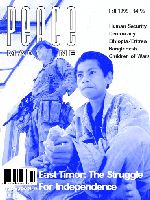
Peace Magazine Fall 1999, page 4. Some rights reserved.
Search for other articles by PMag staff here
With the support of the John Holmes Fund, these first three issues of 1999 are reflecting on Canada's official foreign policy paradigm - "human security" - which assigns primacy to the well-being of human beings rather than that of states. In the preceding issue (Summer) we covered the historical development of this paradigm and its application by a like-minded group of nations that began their work in Norway last May. We also explored the connection of this policy to development policies and to the important campaign against the small arms trade.
In this, the Fall issue, we cover other aspects of human security, especially its essential connection to democracy - and the great challenges involved in promoting it in conflict situations abroad - specifically, in Ethiopia and Eritrea, the hill country of Bangladesh and, especially, East Timor. In all these cases, democratic self-governance is key to the solution and, accordingly, we are continuing two debates about democracy arising from articles in our preceding two issues.
Particularly important is the debate about "democratic peace." R.J. Rummel has already presented the thesis and the strong evidence that established democratic governments do not make war against other democratic governments. Since most states are now becoming democratic, we have here a formula for ending war - democratize all states! However, not everyone accepts this conclusion. Critics from the left especially object to the idea, since democracy is more common in capitalist than in socialist states, and in leftist thinking, capitalism is often seen as the main danger confronting humankind. Thus the debate over democracy is also connected to the debate (covered in the Summer issue) concerning development policy.
Finally, our attention this time has naturally turned to the terrible ongoing events in East Timor. Two of our frequent contributors, Walter Dorn and David Wurfel, witnessed these events, report on them herein, and consider the future of the Timorese.
The on-going discussion of human security and democracy deserves much attention. Here it will take the form of two related debates. The first concerns Rummel's "democratic peace" theory, highlighted in our May/June issue. This is the assertion that democracies do not go to war against other established democracies. Here, Kevin Shimmin opens the debate with a critique of that theory. In the second debate, John Bacher states that development includes democracy, while Ian Spears defends his original position stated in the Summer '99 issue of Peace. If you wish to participate in this discussion, please submit your comments by November 15.